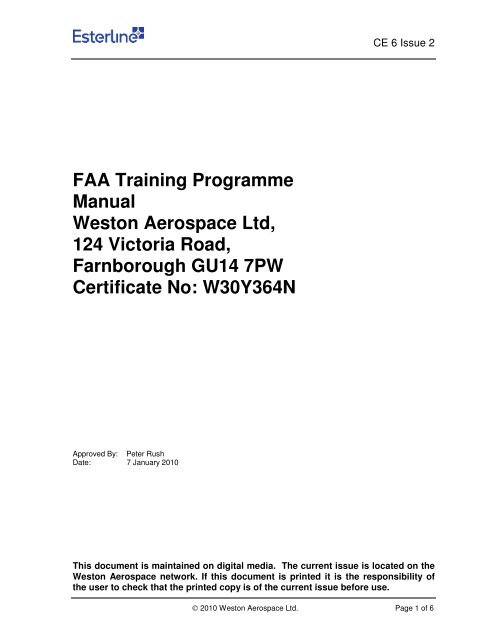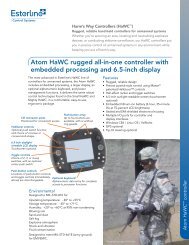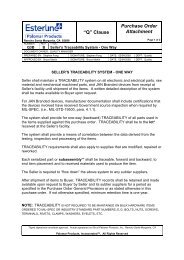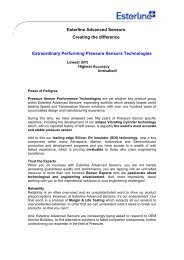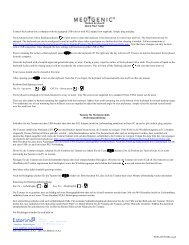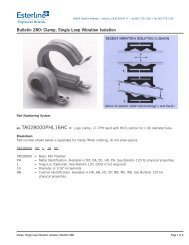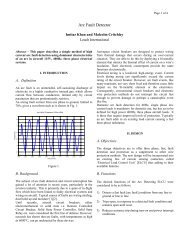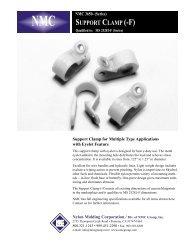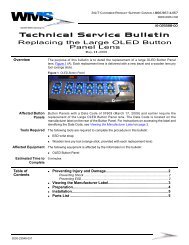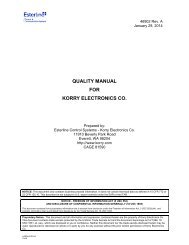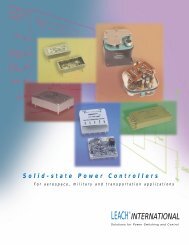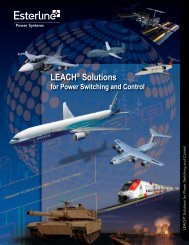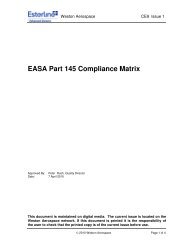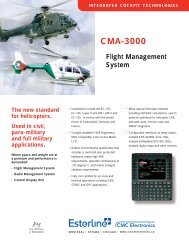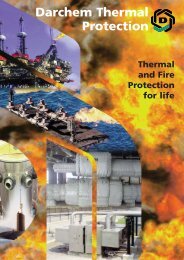FAA Training Programme Manual Weston Aerospace Ltd ... - Esterline
FAA Training Programme Manual Weston Aerospace Ltd ... - Esterline
FAA Training Programme Manual Weston Aerospace Ltd ... - Esterline
Create successful ePaper yourself
Turn your PDF publications into a flip-book with our unique Google optimized e-Paper software.
CE 6 Issue 2<strong>FAA</strong> <strong>Training</strong> <strong>Programme</strong><strong>Manual</strong><strong>Weston</strong> <strong>Aerospace</strong> <strong>Ltd</strong>,124 Victoria Road,Farnborough GU14 7PWCertificate No: W30Y364NApproved By: Peter RushDate: 7 January 2010This document is maintained on digital media. The current issue is located on the<strong>Weston</strong> <strong>Aerospace</strong> network. If this document is printed it is the responsibility ofthe user to check that the printed copy is of the current issue before use.© 2010 <strong>Weston</strong> <strong>Aerospace</strong> <strong>Ltd</strong>. Page 1 of 6
<strong>FAA</strong> <strong>Training</strong> <strong>Programme</strong> <strong>Manual</strong> CE 6 Issue 2Latest AmendmentSectionChanges to latest issueAllRepair Station changed to MRO to harmonise with other exposition documents. ProductAssurance Laboratory Manager title changed to Product Test Manager.1. Added reference to the implementation procedure GWI1033.1 Deleted word “programme” from “training programme files”. Product Test Managerresponsibilities for review added.3.1.2 Quality Director changed to Product Test Manager6. In para. 1 - Quality Director changed to Product Test Manager and “all <strong>Weston</strong> <strong>Aerospace</strong>employees” changed to “all MRO employees”.7. Revised paragraph on <strong>FAA</strong> approval of this manual and distribution.8. Para. 1 removed. Minor wording amendments to remaining paragraph, but method oftraining needs assessment not changed.Regulatory Distribution<strong>FAA</strong> Certificate-holding district officePurposeDetail the training program requirements for <strong>FAA</strong> MROs.Scope<strong>Weston</strong> <strong>Aerospace</strong> service returns to FarnboroughUsersService QualityQuality EngineeringPersonnelReferencesFAR 145CE1Department Skills Analysis FormDefinitions(CHDO)OJTMROCertificate-holding district officeOn the job trainingMaintenance Repair Organisation (Repair Station)Contents1 Introduction.................................................................................................................................................32 Background ................................................................................................................................................33 <strong>Training</strong> Needs Assessment ......................................................................................................................34 Course Definition........................................................................................................................................45 <strong>Training</strong> Methods and Sources ..................................................................................................................56 <strong>Training</strong> Documentation and Records........................................................................................................57 Revision Process........................................................................................................................................58 Work performed for parts 121, 125, 129, and part 135 operators .............................................................59 Work performed by interim maintenance employees.................................................................................510 Human factors..........................................................................................................................................6© 2010 <strong>Weston</strong> <strong>Aerospace</strong> <strong>Ltd</strong>. Page 2 of 6
<strong>FAA</strong> <strong>Training</strong> <strong>Programme</strong> <strong>Manual</strong> CE 6 Issue 21 IntroductionThis training program document contains the policies and procedures <strong>Weston</strong> <strong>Aerospace</strong> uses to determineits training requirements and develop its <strong>FAA</strong> approved training program. <strong>Weston</strong> <strong>Aerospace</strong> is responsiblefor ensuring each MRO employee performing maintenance (including inspection), preventive maintenance,and alteration is capable of performing assigned tasks. This plan identifies the procedures for <strong>Weston</strong><strong>Aerospace</strong> to identify an employee’s training needs in a systematic manner, develop training and/or identifyappropriate existing training, select the training methods, provide training, and record the trainingaccomplished.<strong>Weston</strong> <strong>Aerospace</strong>’s training program consists of the following basic components:• Assessment of training needs to identify overall training needs and individual employee training needs• Course definition to define specific courses of study and individual courses• Identification of training sources and methods to identify options and select how <strong>Weston</strong> <strong>Aerospace</strong> willprovide the training• Recording of training to ensure all employees’ training is documented, and records are retainedThe procedure for implementation of this training program is detailed in GWI103.2 Background<strong>Weston</strong> <strong>Aerospace</strong> has an established training program that includes indoctrination (initial and recurrent),specialised, and remedial training for employees performing maintenance (including inspection), preventivemaintenance, and alteration tasks. The procedures outlined in this manual enable <strong>Weston</strong> <strong>Aerospace</strong> torevise its existing training program to ensure it produces training consistent with all regulatory requirements.All of the information pertaining to the current training records is available for review by the <strong>FAA</strong> principalmaintenance inspector (PI) at <strong>Weston</strong> <strong>Aerospace</strong>’s facilities.3 <strong>Training</strong> Needs Assessment<strong>Weston</strong> <strong>Aerospace</strong>’s needs assessment is a two-part process that includes determining the overalldepartment training requirements as well as individual employee training requirements.3.1 Overall MRO Needs Assessment.To determine its overall training requirements, the Quality Director and Product Test Manager will review thetypes of work being performed and planned, and identify and update the types of knowledge and skills thatthe MRO needs. This will include reviewing such items as the <strong>Weston</strong> <strong>Aerospace</strong> work instructions andprocedures, capability list; customer requirements; expected scope of work; and the relevant experience ofeach technician that will be assigned to perform maintenance, preventive maintenance, or alteration tasks.This general needs assessment will result in a description of the knowledge and skill an employee musthave to properly perform the tasks associated with the work assignment.The results are recorded in a brief summary report establishing the type and level of training required.These basic training goals are documented in the training files, but do not require <strong>FAA</strong> approval.<strong>Weston</strong> <strong>Aerospace</strong> reviews overall training requirements and the requirements of specific individuals inrelation to specific tasks to be performed. <strong>Weston</strong> <strong>Aerospace</strong> will provide training to employees:• When individual employee knowledge or skill deficiencies are identified; or• When significant changes are made to its work scope, or such changes are planned such that theknowledge, skills, or experience render the employee unable to perform work properly such as:1 New regulatory requirements are introduced2 New tools, equipment, or skills are required to perform the work properly3 Work is going to be performed for an air carrier or commercial operator under parts 121, 125,129, or 135© 2010 <strong>Weston</strong> <strong>Aerospace</strong> <strong>Ltd</strong>. Page 3 of 6
<strong>FAA</strong> <strong>Training</strong> <strong>Programme</strong> <strong>Manual</strong> CE 6 Issue 23.1.1 Identification of Capability Deficiencies.<strong>Weston</strong> <strong>Aerospace</strong> may identify individual capability deficiencies through:• <strong>FAA</strong> or other external agency oversight findings• Investigations that lead to voluntary disclosuresThe Quality Director ensures the above programs are regularly reviewed to determine if any trainingdeficiencies exist. The Quality Director in conjunction with the Product Test Manager will decide on theappropriate training. The Product Test Manager will also be responsible for ensuring that the workperformed by the individual requiring additional training will not affect the quality of <strong>Weston</strong> <strong>Aerospace</strong>’swork until the required training is successfully completed. This can be accomplished through additionalsupervision or by changing work assignment.3.1.2. Changes to MRO Work Scope.Whenever <strong>Weston</strong> <strong>Aerospace</strong>’s is planning to change its facilities, equipment, or scope of work as reflectedin its work instructions and procedures or capability list, the Product Test Manager must ensure theemployees are capable of performing the maintenance (including inspection), preventive maintenance, oralteration tasks or that training needs have been identified and met. For changes to <strong>Weston</strong> <strong>Aerospace</strong>’scapability list, the Quality Director and Product Test Manager will review the results of the self-evaluation(required by 14 CFR part 145, sections 145.209 and 145.215) and identify if changes in training needs arerequired.3.2 Individual Needs Assessment.Whenever <strong>Weston</strong> <strong>Aerospace</strong> hires a new employee or transfers an employee to a new task assignment,an assessment of the individual’s skill level and qualifications will be documented. <strong>Weston</strong> <strong>Aerospace</strong> mayaccept previous employer training records or certifications, use a formal written examination, an on-the-jobassessment, or other appropriate means to determine if any training is required to perform the assignedtasks.All new employees will receive induction training organised by the Human Resources department. Anytraining that is specific for supporting all FAR 145 and EASA 145 activities will be organised by the ProductTest Manager.4 Course DefinitionThe Quality Director (or technical or training staff delegated by the Quality Director) will outline trainingrequirements for the company and/or for the individual, based on the results of a training needsassessment.While defining the course or lesson, the following information should be documented, as appropriate:• Objectives and/or required performance outcome—define the knowledge or skill obtained or to be obtainedfrom the course or lesson• Prerequisites—define any knowledge, skill, course, or lesson that needs to be known before the course orlesson can be given• <strong>Training</strong> sources—define any and all training sources available to the MRO for the course or lesson• <strong>Training</strong> methods—define any and all training methods that can be, will be, or were used to impart theinformation• Instructor qualifications—define the knowledge or skill level of the in-house instructor or the qualificationsof the instructor that provided the information (if known)• Other supporting information, such as instructor guides, course material, tools, equipment, or any other aidor information provided during the instruction.Documentation associated with any training accepted or given by the MRO shall be retained in the trainingprogram files or in the file of the individual employee assigned to perform maintenance (includinginspection), preventive maintenance, or alterations under the MRO’s 14 CFR part 145 MRO certificate.<strong>Training</strong> will be provided on an initial and recurrent basis as required to ensure all employees performingmaintenance (including inspection), preventive maintenance, and alteration tasks are capable of performing© 2010 <strong>Weston</strong> <strong>Aerospace</strong> <strong>Ltd</strong>. Page 4 of 6
<strong>FAA</strong> <strong>Training</strong> <strong>Programme</strong> <strong>Manual</strong> CE 6 Issue 2assignments.5 <strong>Training</strong> Methods and Sources<strong>Weston</strong> <strong>Aerospace</strong> will use all training sources and methods available to provide employees with theinformation necessary for them to perform assigned maintenance (including inspection), preventivemaintenance, and alterations tasks correctly.The majority of the training provided by this MRO will use on-the-job training (OJT) methodology.6 <strong>Training</strong> Documentation and RecordsThe Product Test Manager will ensure training records are generated and maintained for all MROemployees. These records demonstrate each individual is capable of performing the maintenance (includinginspection), preventive maintenance, and alteration tasks assigned. The records include <strong>FAA</strong> certifications,other applicable certifications and degrees, <strong>Weston</strong> <strong>Aerospace</strong> or customer qualifications andauthorisations, and for each course completed, the total time credited, the date, the instructor, the location,and the results of any associated examination.All documents showing proof of any of the aforementioned training are maintained for as long as anindividual is an <strong>Weston</strong> <strong>Aerospace</strong> employee and for two years thereafter.Any employee may review their training records to verify that they are complete and current. If an employeenotes a discrepancy in the training record documentation, that employee will inform the Quality Director orProduct Test Manager of the discrepancy. Any change necessary to update an employee’s training recordmust be approved by the Quality Director.7 Revision ProcessThis training manual requires approval by the local Certificate-holding district office before issue. Anysubsequent changes will also have to be submitted to the CHDO for approval.The Quality Director is responsible for co-ordinating all revisions to this manual with the local Certificateholdingdistrict office by forwarding a copy of the contemplated changes. Once approval has been receivedfrom the <strong>FAA</strong> the Quality Director will arrange for distribution of this manual. Distribution to the <strong>FAA</strong> will beby digital media.This manual will be maintained electronically current at all times. All personnel associated with this manualhave access through the <strong>Weston</strong> <strong>Aerospace</strong> documentation system. The local Certificate-holding districtoffice shall be given a copy of this manual. To prevent access to information that is not maintained current,no employee may make a copy of the manual or pages from the manual, without clearly identifying them asuncontrolled copies.All revisions to this manual will be summarised on page 2 of this manual under the Latest Amendmentsection.8 Work performed for parts 121, 125, 129, and part 135 operatorsWhere <strong>Weston</strong> <strong>Aerospace</strong> performs maintenance (including inspection), preventive maintenance, oralteration under its 14 CFR part 145 certificate for an air carrier or commercial operator it will conduct atraining needs assessment in accordance with section 2, paragraph 1, to determine if additional capabilitieswere needed for its employees.9 Work performed by interim maintenance employeesDuring periods of heavy workload, <strong>Weston</strong> <strong>Aerospace</strong> may supplement its workforce with interimmaintenance employees. Before these individuals begin work for <strong>Weston</strong> <strong>Aerospace</strong>, they must undergo aneeds assessment. The Product Test Manager must determine where the individuals will work to conductthe needs assessment and ensure all individuals are provided training appropriate to the particular© 2010 <strong>Weston</strong> <strong>Aerospace</strong> <strong>Ltd</strong>. Page 5 of 6
<strong>FAA</strong> <strong>Training</strong> <strong>Programme</strong> <strong>Manual</strong> CE 6 Issue 2assignment before they are required to begin work.10 Human factorsAll employees, including inspection personnel, shall receive appropriate Human Factors training as required.This training will be recorded on each individuals training record.© 2010 <strong>Weston</strong> <strong>Aerospace</strong> <strong>Ltd</strong>. Page 6 of 6


